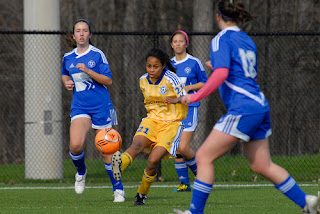A lot of kids start playing house league soccer at the tender age of four. For the next four years around eight is when some kids look to take their soccer to the next level... Rep. We know not all kids are interested in rep soccer some just want to have fun and stay in house league or make the jump to rep later on in a few years. In either case there has been one consistent supporter or drive behind theses kids soccer choices and that's the parent most of the time.
Parents that find that their child has no interest in playing competitive soccer (rep) at an early age are released of unfulfilled expectations. I believe unfulfilled expectation is the root cause of SPB brought on by either parent, player or coach / club. Parents that are excused from ascending to competitive soccer don't have to go through the constant drama associated with climbing the proverbial ladder of taking their child to the next level.
The expectations and demands of having your child continue to develop and take their game to the next level season into season can play havoc on parents mind set. Are we on the right team, is this the best coach, maybe we should switch teams, why is my child not playing more minutes etc etc. Also as a child reaches adolescences and starts expressing them selves they to will come with their own set of expectations that will require parents attention.
Here is a small list of other reason why SPB could be possible.
Focus on winning
Playing on top level teams
Lack of finial support
Child's social adaption
Team practices are to far
Bad chemistry on the team
Coach's inability to communicate
To many team tryouts
Now, you could probably add to this list... why not... go ahead. It would be interesting to here what you have to say on the causes of SPB.
I've noticed soccer parents that have been around me over the years attitude change . The biggest shift in their attitude I would say is when their child turned 14 years old. Its like a light bulb went off in their head and the reality of their child's soccer situation has now become a epic concern. What is this concern, is this a symptom of SPB?




